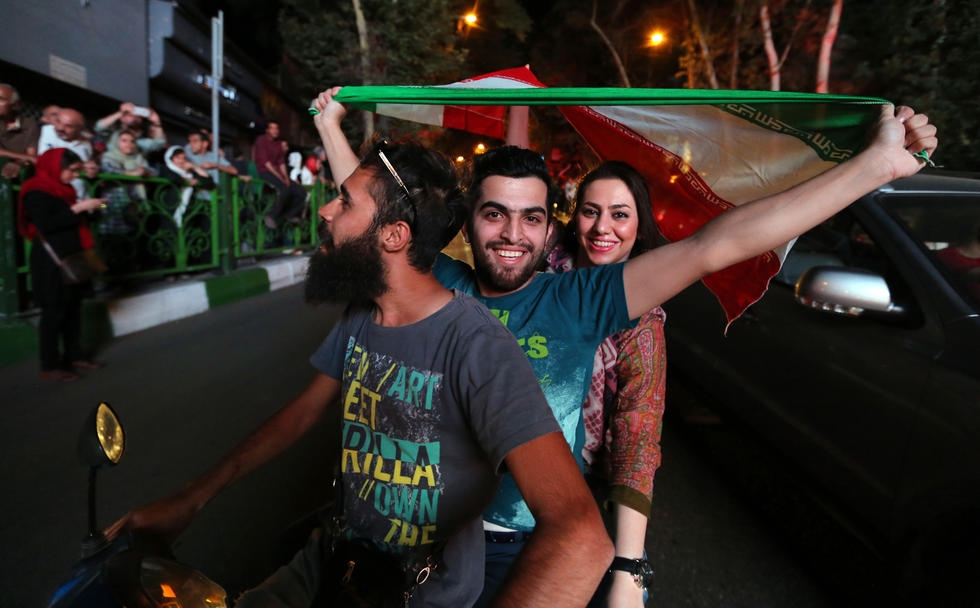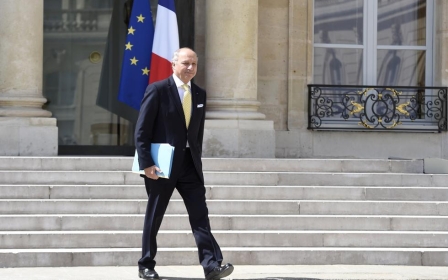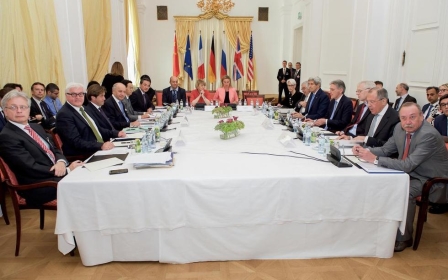After the celebrations, how will Iranians respond to the deal?

So, after 12 years of fierce battling over Iran’s nuclear programme between Iran and the West, finally a landmark deal between Iran and the P5+1 has been reached. Many analysts are identifying the deal as a historical diplomatic breakthrough, the likes of which have not been seen since the collapse of the communist bloc in the late eighties.
The agreement is pending final approval in the legislatures of Iran and the US.
Observers believe that the agreement could substantially alter the political and economic landscape in Iran, the Middle East region and internationally.
There will undoubtedly be new trajectories in Iran’s domestic politics in the wake of the Vienna agreement, which are worth examining.
On Tuesday night, after iftar (fast-breaking reception), Iranians poured into the streets to celebrate the successful conclusion of the nuclear deal. Many shouted in joy as car horns were honked by jubilant motorists.
In a televised statement, Iran’s President Hassan Rouhani remarked, “Today marks both an end and a beginning. An end to the cruelty and wrong and unsubstantiated accusations against the great Iranian nation and a beginning of a new trend in the start of new cooperation in the world.”
Entekhab, a popular news outlet close to the moderates’ camp, referred to the materialisation of the nuclear deal as “the victory of prudence and interaction over rigidity and confrontation”. Their statement was seen as an allusion to the different policy approaches between the Rouhani administration and the hardliners, led by former president Mahmoud Ahmadinejad.
Asr’e Iran, another widely read news agency with moderate tendencies, compared Iranian Foreign Minister Javad Zarif and his team’s efforts to jihad. The agency called on Rouhani to grant the team the Medal of Honour as a result of their bringing about one of the “greatest victories in Iran’s contemporary diplomatic history”.
Conservatives hold their fire
While a complete analysis would be premature, conservative media outlets have surprisingly chosen to stay relatively silent and have only presented the news without opinion or analysis. Among the very few who took a position, Kayhan, the mouthpiece newspaper of the conservatives, called Rouhani’s claims into question by contrasting his statements against President Obama’s. There may be two reasons for their silence.
The first could result from a meeting between the Rouhani administration and Ayatollah Ali Khamenei. On Tuesday night, according to several Iranian news agencies, Khamenei met with the administration and expressed gratitude to the Iranian negotiating team for its efforts in the nuclear talks with P5+1 diplomats. This, at least temporarily, has shielded the negotiating team and Rouhani - and by association the deal itself - from the hardliners’ assaults.
The second reason behind the hardliners’ silence could be their complete confusion. The nuclear agreement has crossed several of the Supreme Leader’s red lines, perhaps leaving the hardliners scratching their heads.
In his fiery remarks on 23 June, Khamenei issued several red lines, among them the denial of access for International Atomic Energy Agency (IAEA) inspectors to suspicious sites, especially those of a military nature, and the rejection of IAEA verification as a pre-condition to the suspension of the sanctions. The agreement clearly crosses both.
It is the case that the suspension of sanctions is conditional upon IAEA verification. But the inspection of military sites is subject to a different procedure. In the absence of an agreement between Iran and the IAEA, a joint commission must decide by at least five votes out of eight what measures should be taken. The decision could be for Iran to accept the inspection by the IAEA.
The members of the commission are the representatives of the six powers including four western countries, the EU, and Iran. This means that the West always possesses five votes in any settlement process, including disagreements about the inspection of military sites.
Reaction is coming
Undoubtedly, the hardliners’ silence will shortly end as they prepare to begin their assaults on the negotiating team and the moderates as a whole.
This divide is not just within the political establishment. In addition to the disagreements between the moderates and hardliners within the nezam, Iran’s society is fragmented between the modernists and religious traditionalists. Modernists view the nuclear agreement as a serious blow against the far right wing. This was evident in a slogan chanted on Tuesday night: “Kayhan [the far right daily newspaper], Israel, condolences, condolences.”
The battle between these two camps is over both values and power. The backbone of the moderates’ supporters are either secularists or those who adhere to liberal Islam. Their worldview and values are in sharp contrast to the conservatives’. For example, the conservatives view the hijab (women’s veil) as a symbol of the Islamic characteristic of the state and must consequently be mandatory. Their opponents, both liberal Muslims and secularists, oppose this strict code.
A power struggle is also another dimension of this conflict. The beginning of this struggle was marked by the unexpected and landslide victory of the reformist president Mohammad Khatami in 1997.
Interestingly, neither camp is interested in combating social and economic inequalities. After the first decade of the revolution, the left, in action and word, died in Iran. Defending kookh’neshinan against kakh’neshinan – the former referring to those who live in very poor accommodation as opposed to the latter who live in palaces – which was central to the discourse of the first decade of the revolution, is now dead.
Massive expectations
Rouhani came to power with expectations that he would solve Iran’s economic problems and provide his grassroots supporters with social liberties. Rouhani and his team view economic growth as a remedy to major social and economic issues, unemployment in particular. To further those goals, Rouhani sought to end the sanctions. Domestic and foreign investors are already preparing for an economic boom as the sanctions are lifted and major Western companies are already fighting over the lucrative contracts which will be up for grabs.
Rouhani has to move fast. According to the World Bank, “The incidence of underemployment has also become highly prevalent. The weakness seen in the labour market comes within a context in which only 36.7 percent of the population is economically active. 750,000 youth are estimated to enter the labour market every year, with a large portion becoming unemployed, abandoning their job search and joining the ranks of the economically inactive population.”
Although it is simplistic to think that Iran’s economic problems will be resolved once the sanctions are lifted, Rouhani himself deserves blame for raising expectations to the highest level by linking the solution to all economic and even non-economic problems to the removal of sanctions. “The oppressive sanctions must be removed so that investment can come and the problems of the environment, employment, industry and drinkable water are resolved,” Rouhani said in June.
While Rouhani tries to bank on the nuclear deal and tighten his grip on power, hardliners will counter by attempting to undermine him. Their goal is to prevent the emergence of a national hero from the moderate camp. They will use every means at their disposal to undermine him.
Red lines crossed
There are clear examples where the nuclear deal crosses several of Ayatollah Khamenei’s red lines. The hardliners will magnify those in their media, gatherings, and perhaps even organise street protests by the Basij militia (volunteer force of the system’s loyalists) and radical students in protest at the nuclear deal.
Having control over the police forces and judiciary, they will likely tighten restrictions on social liberties to provoke disappointment among Rouhani’s supporters, the scenario that we witnessed during the presidency of the reformist Mohammad Khatami.
This competition would put Ayatollah Khamenei in an awkward situation. His silence about the deal crossing his red lines is reminiscent of Ayatollah Khomeini’s decision to end the war with Iraq, which he likened to drinking poison. The silence shows how important the removal of sanctions are to the security of the system. As such, it would be unlikely that Khamenei would take a position against Rouhani, the negotiating team, and the deal.
On the other hand, he cannot abandon his followers and grassroots supporters and leave them confused about his determination and authority in fighting the “global arrogance” led by the United States. It was only on 12 July that he slammed the US as the “true embodiment of arrogance” while stressing that the fight against global arrogance will never come to a halt.
It will be interesting to see how he navigates this perilous, historic turn. His position is decisive in determining the direction of the future developments in the coming months.
- Shahir Shahidsaless is a political analyst and freelance journalist writing primarily about Iranian domestic and foreign affairs. He is also the co-author of “Iran and the United States: An Insider’s View on the Failed Past and the Road to Peace,” published in May 2014.
The views expressed in this article belong to the author and do not necessarily reflect the editorial policy of Middle East Eye.
Photo: Iranians wave the national flag during celebration in northern Tehran on July 14, 2015, after Iran's nuclear negotiating team struck a deal with world powers in Vienna. (AFP)
Middle East Eye propose une couverture et une analyse indépendantes et incomparables du Moyen-Orient, de l’Afrique du Nord et d’autres régions du monde. Pour en savoir plus sur la reprise de ce contenu et les frais qui s’appliquent, veuillez remplir ce formulaire [en anglais]. Pour en savoir plus sur MEE, cliquez ici [en anglais].





